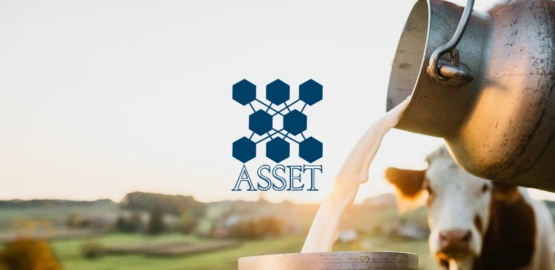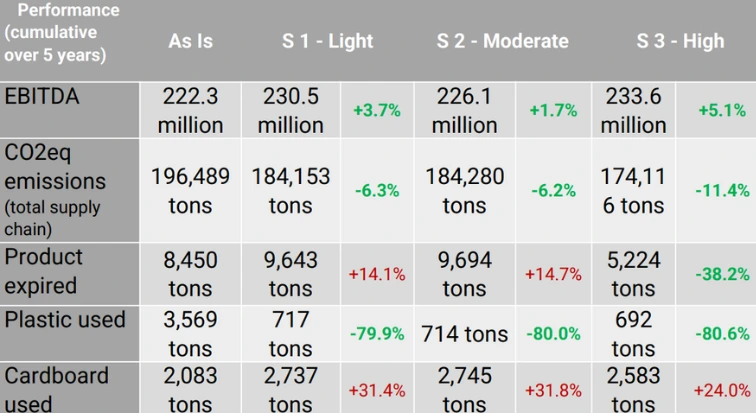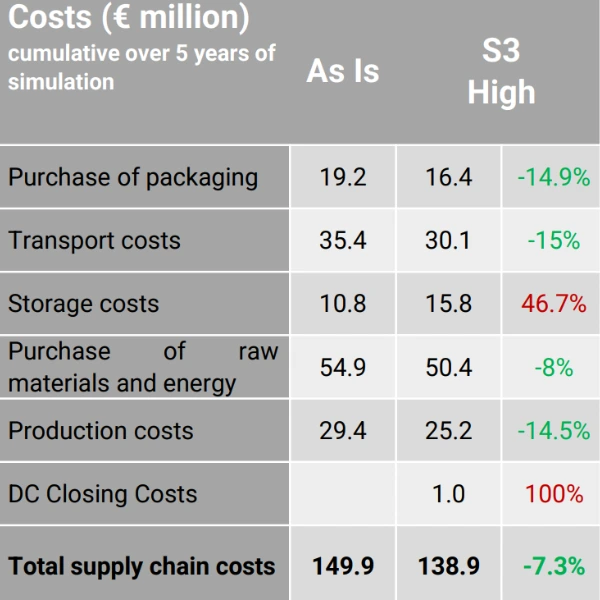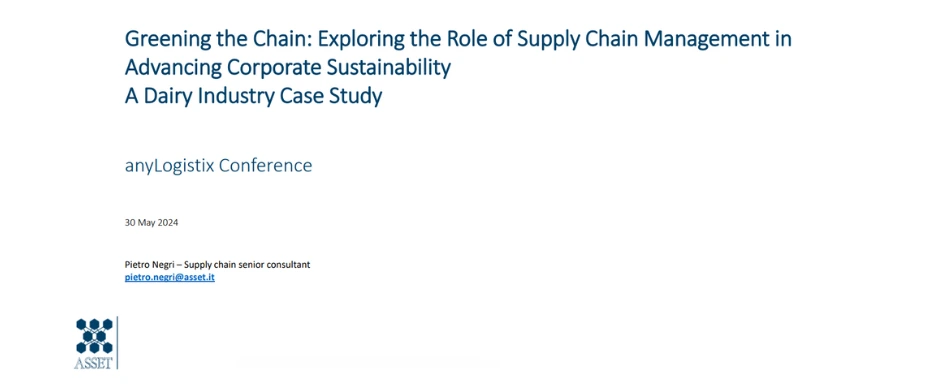Interested in how companies worldwide use anyLogistix to achieve supply chain sustainability? Read our case study on optimizing organic waste collection, which significantly reduced CO2 emissions and minimized transport costs.
Join us online




A leading Italian dairy producer wanted to reduce its carbon footprint while maintaining strong financial performance. Operating in a competitive market, the company needed to evaluate three sustainability scenarios and identify which would deliver the best balance between environmental benefits and financial results.
Asset Consulting used anyLogistix to create a digital twin of the company’s production and distribution network, including policies, flows, and CO₂ emissions. This baseline model simulated each sustainability scenario, tracking KPIs such as EBITDA, CO₂ output, expired product volumes, and packaging use. anyLogistix dashboards compared environmental and financial performance to support data-driven decisions.
The production and distribution of food products significantly contribute to global carbon emissions, impacting climate change and environmental sustainability. This is due to the resources and processes involved at each stage of the supply chain, from farming to packaging and transportation.
In response, a leading Italian dairy company decided to review its current policies to reduce its carbon footprint and contribute to a greener tomorrow. Recognizing the importance of sustainability in the supply chain, they partnered with Asset Consulting to identify the best practices for decarbonization, the process of reducing CO2 emissions. By enhancing environmental sustainability within its supply chain, the company aimed to balance these efforts with a focus on financial performance.
Interested in how companies worldwide use anyLogistix to achieve supply chain sustainability? Read our case study on optimizing organic waste collection, which significantly reduced CO2 emissions and minimized transport costs.
Operating in a highly competitive market, the Italian company had to think carefully about potential changes to its current policies and how they could impact financial KPIs (Key Performance Indicators). The company had three possible scenarios for improving sustainability. The challenge was to estimate each of them and find the best one to balance environmental and financial aspects.
The dairy company had the following scenarios to analyze:
Asset Consulting chose anyLogistix, a tool designed for advanced supply chain modeling, to meet the project's ambitious goals.
The consulting team first created a digital twin, a virtual model of the supply chain and transportation networks, incorporating everything from production flows to policies. This model was essential for adding precise data and logic to calculate CO2 emissions effectively along the supply chain.
Check out our step-by-step guide to learn more about sustainable logistics management and how to achieve it for your business. There, you will find out how to reduce CO2 in 6 steps using anyLogistix.
With the digital twin of the production and distribution processes in place, Asset Consulting could simulate different scenarios to improve sustainable logistics management.
The defined supply chain and transportation network in anyLogistix (click to enlarge)
To identify the best scenario under which the Italian dairy company could achieve both sustainable logistics management and financial benefits, the consultants simulated the current state of production and distribution. They then used this simulation as the baseline for their analysis.
The straightforward dashboards in anyLogistix helped Asset Consulting track the following KPIs:
Dashboards in anyLogistix for tracking KPIs that are important
for sustainability in the supply chain (click to enlarge)
After running all three scenarios and comparing them with the baseline, Asset Consulting identified that the high-impact scenario (S3) was the most effective. This scenario involved centralizing stock management and closing one distribution center.
As a result, the Italian dairy company reduced its carbon footprint by 11% while increasing its EBITDA by over 5%.

The comparison of cumulative financial and environmental KPIs across different scenarios
The company successfully achieved positive financial and environmental results. Additionally, by implementing the recommended scenario, they reduced the total supply chain costs by 7.3%.

Comparing the costs of the old and new supply chains
underscores the importance of sustainability
The results proved that the dairy company could successfully integrate environmental sustainability into its supply chain without sacrificing financial gains. By utilizing anyLogistix and adopting decarbonization strategies, the Italian dairy company reduced its carbon footprint and achieved improved profitability. This success set a compelling example of sustainable logistics management.
This case study was presented by Pietro Negri, Asset Consulting, at the anyLogistix Conference 2024.
The slides are available as a PDF.
